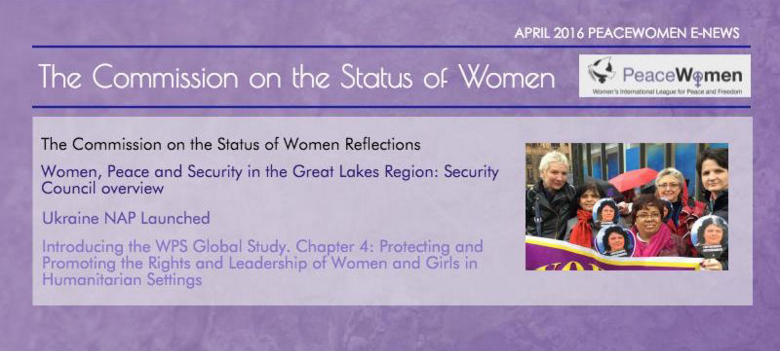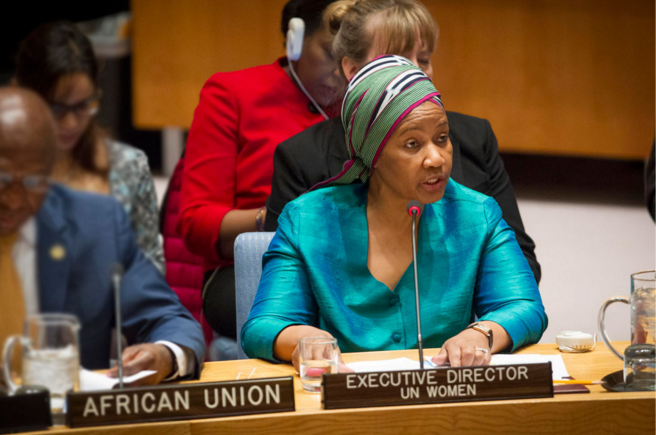ENEWS APRIL 2016: REFLECTING ON CSW60

Reflecting on CSW60: For Women’s Empowerment, Deepen Roots, not just Borders of Peace and Gender Justice
By Abigail Ruane
Last month, over 40 WILPF activists from 11 countries joined over 4,100 activists worldwide at the 60th Commission on the Status of Women (CSW) in New York. WILPFers joined from: Australia, Bosnia, Democratic Republic of the Congo (DRC), Japan, Lebanon, Netherlands, Nigeria, Norway, Syria, the US, and the UK. We strategized, mobilised, and learned from each other.

Participants at WILPF symposium, 2016. Photograph by Marta Bautista Forcada
The time we spent together was invigorating and inspiring! In the face of military and corporate power, apathetic policymakers, and institutional inertia, there is room for hope: Women human rights defenders and peace activists every day are taking action to build democratic peace based on gender justice in their communities.
Together, we called for not just women’s empowerment, but for feminist strategies that enable transformational change. We demanded action to move from a political economy of war to a political economy of demilitarisation, gender justice, and peace. As WILPF Secretary General, Madeleine Rees, demanded at our symposium: “We need to challenge militarism as a way of thought.”
Yet despite the energy and passion of formidable feminist leaders worldwide, a current of frustration and concern also threaded through CSW’s conversations. Conflicts and violence continue, with ever more disturbing updates such as on sexual violence in the Central African Republic (CAR), emerging conflicts and violence threatening from Bosnia to the DRC, and the unabating refugee and humanitarian crisis and conflict around Syria. Meanwhile, we have yet to have a woman – let alone a feminist - UN Secretary General, and women human rights defenders and peace activists continue to face huge funding challenges and restricted civil society space to conduct their important work.
How can we reconcile the potential that we see among visionary feminist leaders on one hand, with the obstinate systems of militarism, exploitation, and violence on the other?
Current failures can be seen to be in part due to an imbalance in strategic action for gender equality goals: When CSW was established in 1947, it was formed with a two-part purpose. First, it was to be a “sparkplug for women’s interests.” Second, it was to mainstream gender equality more broadly. Yet 60 years after its creation, has the balance shifted too much away from being a “sparkplug”? In focusing on gender mainstreaming, is too much being watered down?
Time and time again at CSW, I heard member states, but also representatives from UN entities and even civil society emphasise how investing in women is a means to various ends – to sustainable development, to counter-terrorism, to countering violent extremism. Strong women’s human rights is certainly a solid foundation for these aims. It is also important for allies to recognise these contributions. However, women’s human rights are not just a means to an end but rights in and of themselves.
By prioritising broad alliances for gender equality at the expense of dedicated feminist leadership, we may be reducing the scope of our vision and transformative potential for women’s rights and peace.
As the WILPF PeaceWomen team continues our work, we have new opportunities for collaboration and leadership. It is my honour and privilege to share that I have taken on the position of WILPF PeaceWomen Programme Director, and will be leading WILPF’s work on Women, Peace and Security moving forward. At this time, Maria Butler will be taking on the position of WILPF Global Programmes Director to strengthen WILPF’s integrated approach, and Grace Jennings-Edquist is taking on the role of WILPF PeaceWomen Programme Associate.
Together, we will continue to work in solidarity with activists and partners everywhere for a world with deeply rooted vision for broad impact.
Join the movement! Through ties of sisterhood and solidarity, we can weave the fabric of a more just and peaceful world.
Read PeaceWomen’s full report on CSW60 here.
Women, Peace and Security in the Great Lakes Region: Security Council Overview
By Marina Kumskova
The role of women in conflict prevention in Africa was the theme of a timely Security Council debate held on Monday 28, 2016. The ministerial-level open debate, held under the Angolan presidency, continued the series of discussions on conflict prevention and resolution in the Great Lakes Region initiated by Angola in March 2016.
Emphasising the role of women in creating more peaceful and equitable societies on the continent, speakers demanded that women be placed at the centre of efforts to prevent or resolve conflict in Africa, and particularly the Great Lakes Region.

UN Women Executive Director Phumzile Mlambo-Ngcuka address Security Council meeting 'The role of women in conflict prevention and resolution in Africa'. Photograph by United Nations/Loey Felipe
During the debate, many member states agreed that women’s empowerment is a crucial line of defence against militarism and violent extremism. In this regard, some representatives of member states such as Kazakhstan and Brazil reiterated the need for further state funding to support women’s involvement in peace processes.
It is critical that, moving forward, women-led civil society receive holistic, ongoing support for their critical work as women human rights defenders. Their contribution to preventing terrorism or violent extremism must not instrumentalised but be holistically supported by member states.
For a more detailed analysis of the ministerial-level open debate, please visit our United Nations Security Council Open Debate Watch page.
Ukraine NAP Launched
By Joanna Lockspeiser
In February 2016, the Government of Ukraine launched the Ukrainian National Action Plan (NAP) for the implementation of Security Council Resolution 1325 on Women, Peace and Security. As civil war continues to rage in the Eastern European country – which is gripped by ethnic conflicts and a foundering economy – the NAP comes at a critical time.

Bullet holes in Kiev, 2014. Photograph by Ivan Bandura
Since 2014, the armed conflict has created a situation of insecurity, which carries a threat to women’s security and respect for human rights. Women have been deeply affected by displacement in the wake of violence. Due to limited economic opportunities linked to austerity measures, women bear the brunt of the burden of care in the face of reduced resources, and face particular risks, especially those affected by internal displacement. Despite numerous legislative protections, The Office of the United Nations High Commissioner for Human Rights (OHCHR) and women-focused NGOs have reported an increase in cases of domestic violence, rape, prostitution and “survival sex”.
In light of this context of insecurity, Ukraine’s adoption of a NAP creates an opportunity to for action in the country. It is critical to ensure implementation of the NAP commitment to include civil society in NAP implementation and monitoring, including around disarmament, demobilization, reintegration (DDR) processes. WILPF notes with concern that the NAP states that civil society participation in NAP implementation is “upon consent” of the Order of Ministries, and urges that this consent be provided and that their full and substantive participation be integrated in the implementation and monitoring phases. This engagement should be further strengthened to address key gap areas including disarmament and action addressing how proliferation of weapons impacts women’s security.
The NAP is one step forward in identifying key aspects to address gender equality in Ukraine. Action to ensure effective and inclusive implementation is critical to moving from words to action.
For more, see PeaceWomen’s analysis of Ukraine’s National Action Plan here.
Introducing Chapter 4 of the WPS Global Study: Protecting and Promoting the Rights and Leadership of Women and Girls in Humanitarian Settings
By Nela Abey
This chapter discusses the range of violations suffered by women and girls in humanitarian settings and their right to protection under international humanitarian, refugee and human rights law. The study reveals that while increased attention is being paid to violence suffered by women and girls – thus resulting in greater advocacy, visibility, and the development of technical tools – there is insufficient funding dedicated to services for survivors. Women’s security is linked to women’s human rights, such as the right to education, as well as to participation and leadership. However, gender equality is not yet fully embraced as an organising principle of humanitarian work, hindering the effectiveness of humanitarian assistance in its current form.
Key recommendations:
- Fund the establishment of an independent monitoring mechanism run by women’s civil society groups and women’s human rights defenders to track performance on gender equality, as well as compliance of humanitarian assistance with normative standards and international human rights law
- Invest in translating all relevant tools on sexual and reproductive health and prevention and response to sexual and gender-based violence into local languages to ensure local engagement and sustainability
Facts and Figures:
- Currently, 27 countries have laws that discriminate against women in their ability to confer nationality to their children, leading to statelessness, particularly in conflict settings
- Prioritizing women in food distribution is strongly correlated with greater dietary diversity and, in some cases, a 37 percent lower prevalence of hunger
- For more information, see UN Women’s Global Study Factsheets or the entire Global Study on Women, Peace and Security
PeaceWomen Accepting Fellowship Applications

WILPF/PeaceWomen 2015-2016 fellows and team members: (L-R) Joanna, Katie, Marta, Marina and Marta. (Photograph by Nela Porobic Isakovic)
Are you interested in peace, disarmament, and gender justice? Join our team!
The PeaceWomen Internship and Fellowship Programme, based in New York City, is currently accepting applications. This programme targets young professionals and academics interested in the Women, Peace and Security (WPS) Agenda in an effort to provide professional development skills and opportunities for engagement with civil society on the implementation of the WPS Agenda at the local, national, and international level.
For the full position posting, please see here.
